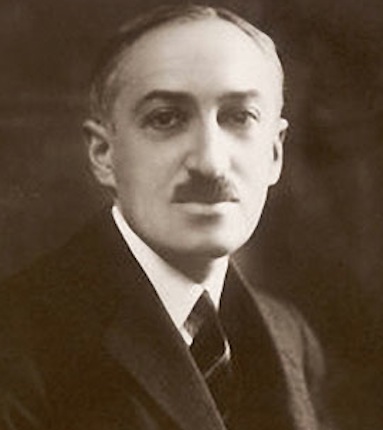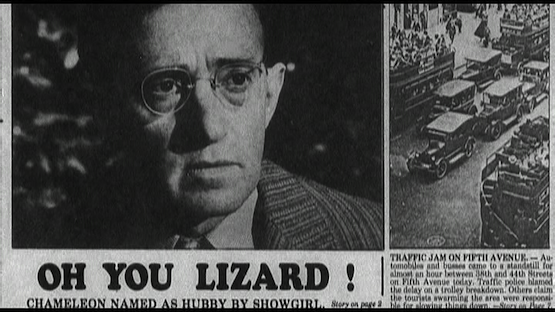 Even if the founders of Kansas City had stuck to their initial plan to name the town after our favorite native creature, one suspects André Maurois, roving intellectual, French patriot, and all-round good guy would have still been as fulsome in his praise. All my life I’ve seen the following quote of his flaunted by local boosters like the Chamber of Commerce and the J.C. Nichols Company:
Even if the founders of Kansas City had stuck to their initial plan to name the town after our favorite native creature, one suspects André Maurois, roving intellectual, French patriot, and all-round good guy would have still been as fulsome in his praise. All my life I’ve seen the following quote of his flaunted by local boosters like the Chamber of Commerce and the J.C. Nichols Company:
“Who in Europe, or America, for that matter, knows that Kansas City is one of the loveliest cities on earth? And, yet it is true.”
It was easy to get him confused with other French writers like Francois Mauriac and André Malraux, who had similar names and were active in the same era. However, it’s definitely worth the trouble to figure out who exactly he was, how he got here, and what the quote revealed about an incurable optimist who very easily could have yielded to despair given the series of hard knocks he sustained yet persevered and triumphed.
Born Emile Salomon Wilhelm Herzog in 1885 in Normandy, France, he was the scion of a wealthy family of Jewish textile manufacturers. He wrote under the pen name, ‘André Maurois.’
He served with distinction in the First World War as a liaison officer with the British for the French Army. He used that experience to good effect by writing a best seller in English on his wartime experience, “The Silences of Colonel Bramble.”
 Before the war, he had married a beautiful Polish-Russian aristocrat but she died of complications from pregnancy in 1924. His second wife was Simone de Caivallet, the grand-daughter of the novelist Anatole France, who proved to be a capable help-mate and partner for the rest of his life.
Before the war, he had married a beautiful Polish-Russian aristocrat but she died of complications from pregnancy in 1924. His second wife was Simone de Caivallet, the grand-daughter of the novelist Anatole France, who proved to be a capable help-mate and partner for the rest of his life.
I think British critic Sarah Bakewell was right when she likened Maurois to the Woody Allen character ‘Zelig’, who turns up at every historic occasion, maybe always on the fringes but always present, unobtrusive but observant.
The inner circles of the British ruling class in 1917 London described by Cynthia Asquith in her Diaries? Maurois was there. The world of international diplomacy at its peak in Paris, 1919 during the negotiation of the Versaille Treaty? Maurois was there. Princeton University during the era of Albert Einstein in the years leading up to World War II? Maurois was there.
 Throughout the entire period between the wars Maurois kept up a prodigious output. He churned out first-rate biographies of historic figures, novels, essays,science fiction, memoirs-you name it. A member of the Académie Francaise, he served with the Free French Forces in the Second World War after a period of exile in Kansas City. He taught French literature at the University of Kansas City (present day UMKC) after he and his wife were brought here by the generosity of the Kemper banking family. He continued writing until his death in 1967.
Throughout the entire period between the wars Maurois kept up a prodigious output. He churned out first-rate biographies of historic figures, novels, essays,science fiction, memoirs-you name it. A member of the Académie Francaise, he served with the Free French Forces in the Second World War after a period of exile in Kansas City. He taught French literature at the University of Kansas City (present day UMKC) after he and his wife were brought here by the generosity of the Kemper banking family. He continued writing until his death in 1967.
This was a person who lost everything in 1940-home, business, possessions-at age 55.
Nonetheless, he came here and made a new life for himself. He honored our city by his presence and we should return the favor by honoring his memory.









Nice piece Dwight. Ed Hicks and Joel Martin would both be very proud.
I think I might have to dust off my copy of ‘The Eternal Kansas City’ by my favorite troubador Van Morrison in tribute to this plucky Frenchie.
Really nice Dwight.
Excellent.
Thanks for the kind words. I feel somewhat remiss in that I omitted the best quote of all by the author from his days here: “Better a garden in Kansas City than an estate in Paradise”!
My wife and I are gardeners here in KC; we grow herbs and veggies in our yard. And we’re also transplants, having only moved here two years ago. Anyway, since we indeed have a garden in KC, we had a small plaque made with this quote: “Better a garden in Kansas City than a park in Utopia.” I guess it came from him? Maybe just a different version? We never knew where the saying came from, exactly.
Good point! The actual French word Maurois used was “parc”,but my understanding is that in French it means the grounds or formal garden of a private manor house or chateau and not so much “park” in the British or American sense of a public park,which is why I used “estate”. You’re absolutely right in a second way,Maurois was the source of the quote in your garden but I have yet to track it down as to which work he wrote it in. He was one of the earliest biographers of Proust so whoever studied Proust with him at the University of KC got a world class teacher.
Funnily enough, my wife found it written on a scrap of paper in a local house that we looked at prior to moving here. We didn’t end up buying that house, but we did get one not far from it. We were looking around this empty place and there was a folded piece of paper that she picked up to throw away, and that was written on it. Since we’re gardeners and planned to have a garden in KC, we loved it.
I just googled the phrase and found it in a Google Books result for a book I’ll try to track down. Not sure if the results will post but here it is: http://books.google.com/books?id=i8cfSW7FaB8C&pg=PA59&lpg=PA59&dq=%22better+a+garden+in+kansas+city+than+a+park+in+Utopia%22&source=bl&ots=d0yRRyY69Z&sig=eD2usM3uAdKuRnB601mEvxJpIqo&hl=en&sa=X&ei=RPprUu2qC7GyygG5wYGYBg&ved=0CCsQ6AEwAA#v=onepage&q=%22better%20a%20garden%20in%20kansas%20city%20than%20a%20park%20in%20Utopia%22&f=false
The book is The Worlds of Andre Maurois and I just found some cheap listings for it on Half.com. Now I kind of want it; might order.
I’m sure that in 1967 Kansas City was still nice, alas it is no longer how it was. The formerly nice areas in KCMO are becoming Cleavervilles and the people who used to keep them nice are staying in their south JoCo strip malls and McMansionvilles. I’m planning my yearly trip to KC and there’s almost no place you’d want to stay… It’s sad.
Try either the Chateau Avalon, or the Great Wolf Lodge (with accompanying water park) in lovely western Wyandotte County.
It just hit me, that looks like Julius Karash.